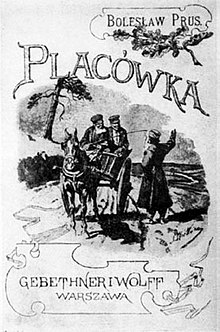The Outpost (Prus novel)

Early front cover of The Outpost by Bolesław Prus published by Gebethner i Wolff with original engraving
|
|
| Author | Bolesław Prus |
|---|---|
| Original title | Placówka |
| Language | Polish |
| Publisher | Gebethner i Wolff , Warsaw |
The Outpost (Polish title: Placówka) was the first of four major novels by the Polish writer Bolesław Prus. The author, writing in a Poland that had been partitioned a century earlier by Russia, Prussia and Austria, sought to bring attention to the plight of rural Poland, which had to contend with poverty, ignorance, neglect by the country's upper crust, and colonization by German settlers backed by Otto von Bismarck's German government.
Prus began writing The Outpost as early as 1880, initially titling it Nasza placówka (Our Outpost), but soon suspended work on it in favor of close observation of rural life, chiefly around Nałęczów, where he vacationed for 30 years from 1882 until his death. He resumed work on the novel in 1884. Written in installments, The Outpost was serialized in the illustrated weekly, (The Wanderer) between March 19, 1885, and May 20, 1886. The first book edition appeared in 1886.
The Outpost is a study of rural Poland under the country's foreign partitions. Its principal character, a peasant surnamed Ślimak ("Snail", in Polish), typifies his village's inhabitants, nearly all illiterate; there is no school under German imperial rule. Religion is naively superficial: when a villager, Orzechowski, buys an engraving of Leda and the Swan for a mere three roubles at the landowner's moving-out sale, he prays before it with his family, much as other villagers venerate old portraits of noblemen who had been benefactors of the local church.
Changes are, however, coming to the area. A railway line is being built nearby. The owners of a local manor house sell their estate to German settlers financed by Bismarck's German government. Polish landowners, who speak more French than Polish, are happy to take the money and move to a city or abroad, away from the boring countryside. Ślimak's farm becomes an isolated Polish in an increasingly German-settled neighborhood.
...
Wikipedia
